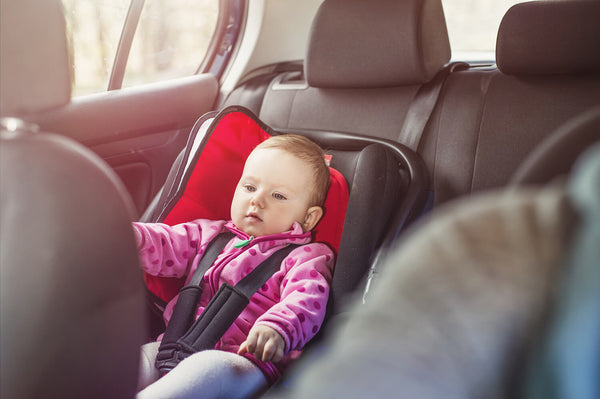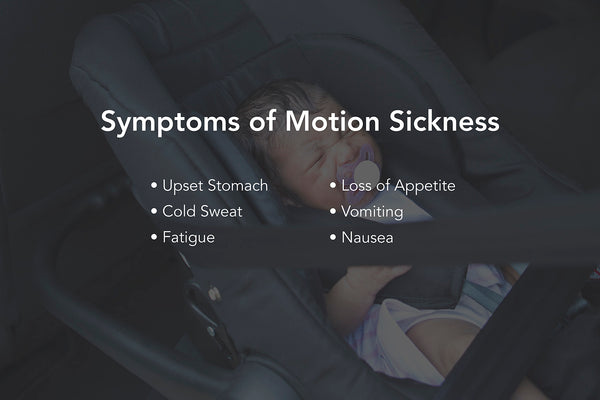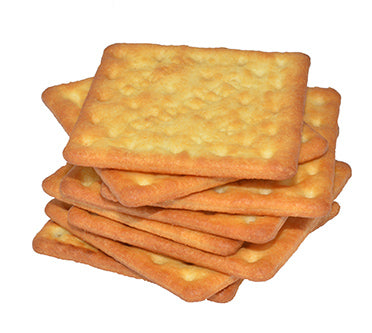Infant Car Sickness

We sent an email with a link to update your password


As parents, we try to do everything we can to keep our children safe from harm. If your little one is suffering from infant car sickness, it can present a number of problems—not to mention, pain and discomfort for your little one.
Fortunately, there are a handful of ways to prevent infant car sickness. Once you understand the symptoms of car sickness in toddlers and babies—and its causes—preventing and treating them becomes a much simpler task.
Use the links below to navigate our guide, and learn how to settle your little one's tummy before your next road trip:
The first step in preventing car sickness in toddlers is to understand it. Car sickness is a type of motion sickness that occurs when the brain receives conflicting information from the inner ears, eyes, and nerves in the extremities.
Much like seasickness, or any other type of motion sickness, babies, kids, and adults all experience motion sickness from the same causation. However, the solutions vary child to child.
The symptoms of motion sickness are fairly common and easy to recognize. Here are the signals you should be on the watch for:

If your baby is consistently getting sick on every car trip, it’s likely motion sickness. Make sure you’re checking on your child for symptoms as frequently as possible, especially during your first few road trips following their birth.
There are plenty of natural ways to help prevent motion sickness in your little one.

If your little one is still very young, consider getting a portable travel crib or bassinet so you can keep your child safe and off the grass at a park when you stop. Allowing your baby to lay prone and still for 10-15 minutes after an hour of driving is the ideal way to give them a break.
In addition to making frequent stops and other physical remedies to prevent car sickness in toddlers, there are some home remedies as well. Here is a list of foods that can help prevent your baby’s motion sickness from occurring:
 Ginger Snap Cookies: Not only are they delicious, but they will also work wonders for your little one's tummy. Give your child one or two gingersnap cookies (depending on their size and sugar content) before the start of the trip. Ginger is a great natural remedy for upset stomachs—if your baby will eat raw or pickled ginger, it’s a much better, as it’s a less sugary alternative.
Ginger Snap Cookies: Not only are they delicious, but they will also work wonders for your little one's tummy. Give your child one or two gingersnap cookies (depending on their size and sugar content) before the start of the trip. Ginger is a great natural remedy for upset stomachs—if your baby will eat raw or pickled ginger, it’s a much better, as it’s a less sugary alternative.
 Crackers: These salty treats are great for settling tummies that are already upset. If your little one eats something that disagrees with them on the trip, or they have a naturally acidic stomach that makes motion sickness symptoms worse, crackers are a wonderful remedy.
Crackers: These salty treats are great for settling tummies that are already upset. If your little one eats something that disagrees with them on the trip, or they have a naturally acidic stomach that makes motion sickness symptoms worse, crackers are a wonderful remedy.
An empty stomach will only increase the likelihood of car sickness in toddlers.
However, what you feed your child before and during the car trip is quite important. Avoid anything high-fat or greasy and try to stick to easy to digest foods like oatmeal, pureed fruits/vegetables, and scrambled eggs.
Don’t let infant car sickness ruin another family vacation or long car ride to see grandma and grandpa; use these helpful tips to make sure the entire trip runs smoothly.
Guava Family has the travel gear you need to keep your baby comfortable no matter where you’re headed.